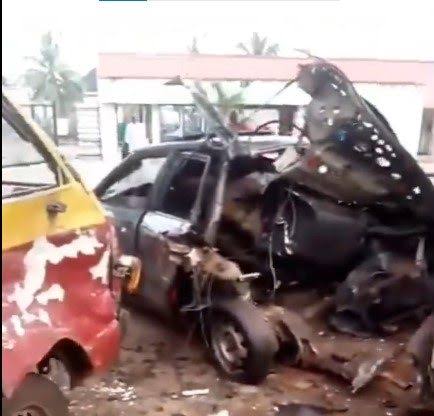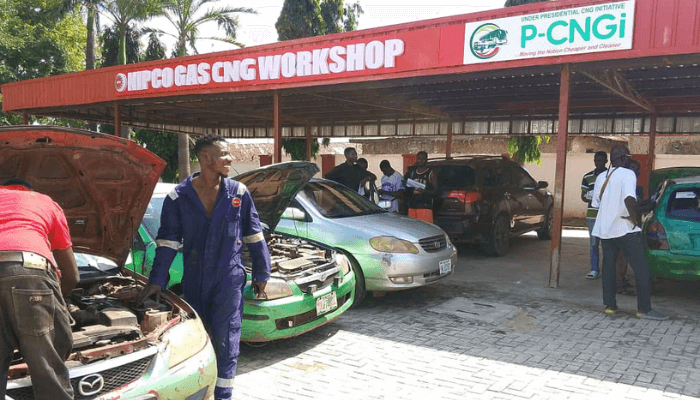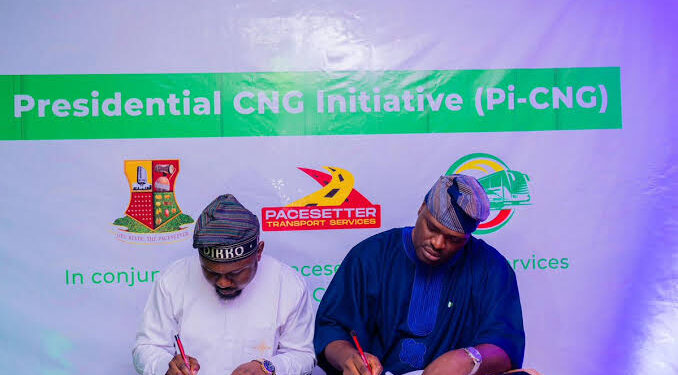The Presidential Committee on Compressed Natural Gas Initiative (PCNGI) has reassured Nigerians of the safety of Compressed Natural Gas (CNG)-powered vehicles, following a recent explosion in Benin City that left three persons injured. The incident, which involved a CNG-powered vehicle, highlighted the dangers of unauthorized modifications and the use of unapproved CNG cylinders, emphasizing the critical need for strict adherence to safety standards.
The explosion occurred at a NIPCO CNG Station located at Ikpoba Hill in Benin City and was traced to the use of a non-certified CNG cylinder. This incident serves as a stark reminder of the risks associated with using unauthorized conversion services and tampering with CNG vehicle components. In response, the PCNGI is taking swift action to ensure that such incidents are avoided in the future, by stating the importance of compliance with regulatory standards and proper handling of CNG equipment.
Michael Oluwagbemi, the programme director and chief executive of PCNGI, had issued a statement on Friday addressing the unfortunate event. He stressed that the use of only accredited centers for CNG vehicle conversions is essential for ensuring the safety of drivers, passengers, and the general public. “Only accredited conversion centres must be patronised and safe handling of CNG, just like petrol, ensures safety for all,” he said.

Oluwagbemi assured Nigerians that the PCNGI, in partnership with other key organizations, is committed to enhancing safety in the CNG sector. He announced that the agency, alongside its partners, will soon introduce the Nigeria Gas Vehicle Monitoring System, a comprehensive tool designed to improve oversight and safety across the CNG ecosystem. This system will help monitor compliance with safety regulations, track CNG vehicles, and ensure that bad actors who fail to adhere to safety standards are identified and penalized.
The PCNGI is working closely with several regulatory bodies, including the Standard Organization of Nigeria (SON), the Nigerian Midstream and Downstream Petroleum Regulatory Authority (NMDPRA), the National Automotive Design and Development Council (NADDC), and the Federal Road Safety Corps (FRSC). Together, these organizations are developing a robust regulatory framework to ensure that the CNG ecosystem in Nigeria operates safely and efficiently. According to Oluwagbemi, the collaborative efforts of these agencies will play a crucial role in enforcing the necessary standards to prevent future incidents.
“This incident reiterates the impetus of the PCNGI and our partners (at SON, NMDPRA, NADDC, and FRSC) on the soon-to-be-launched Nigeria Gas Vehicle Monitoring System to tackle any bad actors in the ecosystem that seeks to make this safer, cheaper, cleaner, and more reliable source of fueling risky for all,” he added.

Oluwagbemi expressed his deepest sympathies to those injured in the explosion and offered words of gratitude that no lives were lost. He explained that initial investigations into the incident had revealed that the vehicle’s CNG cylinder had been improperly modified, which was the primary cause of the explosion. The cylinder, which was found to be welded and altered, was not approved for use with CNG, a discovery that has prompted regulatory authorities to intensify their scrutiny of conversion centers and CNG stations nationwide.
“The PCNGI also notes that safe handling of all hydrocarbons is critical to their safe use,” Oluwagbemi emphasized. This statement reinforces the broader message that the safe use of CNG, like other hydrocarbons, requires strict adherence to established safety protocols. Oluwagbemi highlighted that while CNG is a cleaner, more affordable, and more reliable alternative to traditional fuel sources, it must be handled correctly to avoid dangerous situations.
In light of this incident, the police, regulatory bodies, and the management of NIPCO are conducting a detailed investigation to determine the exact circumstances that led to the explosion. Oluwagbemi confirmed that the PCNGI is closely coordinating with these authorities to ensure that a thorough investigation is carried out and that those responsible for the unauthorized modification are held accountable.
The PCNGI’s upcoming safety monitoring system is expected to play a pivotal role in ensuring the safety and reliability of CNG-powered vehicles in Nigeria. By tracking vehicles and conversions and maintaining strict oversight over the entire CNG ecosystem, the system aims to prevent incidents like the one in Benin City from happening again. Through this initiative, the PCNGI is positioning itself as a leader in promoting the safe and widespread use of CNG in Nigeria, a move that aligns with the government’s broader efforts to transition to cleaner and more sustainable energy sources.
Oluwagbemi’s call for full compliance with the new system of regulation is a reminder to all stakeholders, including vehicle owners, CNG station operators, and conversion centers, to strictly adhere to the safety guidelines established by the PCNGI and its partner agencies. Only through cooperation and a commitment to safety can the potential benefits of CNG as a fuel source be fully realized.
As Nigeria continues its transition towards greater use of CNG, the PCNGI remains committed to ensuring that safety remains a top priority. The agency’s partnership with leading regulatory bodies reflects a comprehensive approach to creating a safer, more reliable, and more sustainable fuel system for the country’s future. The introduction of the Nigeria Gas Vehicle Monitoring System is expected to be a transformative step in this process, providing the necessary tools to oversee the growing CNG market and protect the safety of all Nigerians.






























